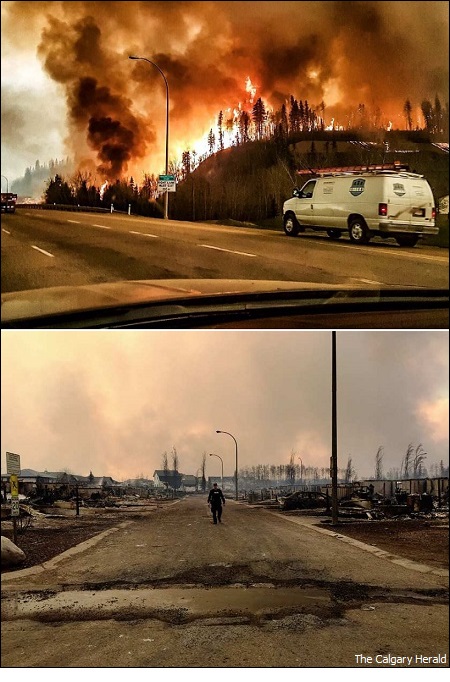
|
|

|
|
| May 8, 2024 |
|
Raging fire forces airlift of 25,000 evacuees in Canada 
The raging wildfire engulfing the Canadian city of Fort McMurray showed no signs of subsiding Thursday, forcing officials to relocate thousands of evacuees farther south for a second time and prepare to airlift 25,000 more from camps north of the embattled area.
Alberta declared a state of emergency Wednesday as crews frantically held back wind-whipped wildfires that had already torched 1,600 homes and other buildings in Canada's main oil sands city of Fort McMurray, forcing over 80,000 residents to flee. The latest evacuees to face relocation are the tens of thousands who initially fled north to seek refuge at oil sands work camps. As the fire, whipped by 25 mph winds, continued to grow, officials scrambled to organize a massive airlift for them to safer terrain more than a hundred miles south of Fort McMurray. Alberta, meanwhile, declared a state of emergency as it sought to cope with the rampaging wildfire and impose a wider mandatory evacuation area. Officials hoped to begin flying 8,000 people out of the northern camps by Thursday evening. “Our focus right now is on getting those people south as quickly as possible,” said Alberta Premier Rachel Notley. The work camps had seemed like a natural safe place for thousands of people rushing out of the city. Fort McMurray is surrounded by vast forests in the heart of Canada’s oil sands, which represent the third largest reserves of oil in the world after Saudi Arabia and Venezuela. Meanwhile, other evacuees who first fled to three suburbs 30 miles south of the city Tuesday and Wednesday were bundled onto buses shortly after midnight Thursday by Royal Canadian Mounted Police who went door-to-door to warn of the spreading wildfire. Many were transported 180 miles farther south to the town of Lac La Biche. Notley said the blaze so far has destroyed or damaged 1,600 buildings and homes in Fort McMurray. She flew over the area and tweeted photos of the fire, which grew to 85,000-hectares, or 330 square miles, on Thursday. “The view from the air is heartbreaking,” she wrote. Scott Long of the Alberta Emergency Management Agency said the fire is largely being kept out of the downtown area thanks to the “herculean’” efforts of firefighters, who are concentrating on saving critical infrastructure, the Associated Press reports. The fires also threatened to torch the city's water treatment plant and the airport, which suspended all commercial flights into and out of the city. About 250 firefighters are battling the blaze, using 12 pieces of heavy equipment and a dozen helicopters, said Danielle Larivee, Alberta’s Minister of Municipal Affairs, The Globe and Mail reports. Airspace is “completely saturated with as many aircraft as are safe,” she said. More help was on the way, with 100 additional firefighters heading to Alberta from Ontario and four air tankers arriving from Quebec, the Edmonton Journal reports. Fort McMurray fire chief Darby Allen appeared to fight back tears at one news conference as he discussed the evacuation effort. “No one is hurt, and no one has passed away right now,” he said. “I really hope we get to the end of this and we can still say that." “We are here, and we are strong and we will keep doing our job,” Allen added, The Star reports. In Ottawa, Prime Minister Justin Trudeau says the Canadian government will match all donations to the Red Cross to assist people displaced by the wildfires in Fort McMurray, the Canadian Press reports. (Source: USA Today) Story Date: May 6, 2016
|